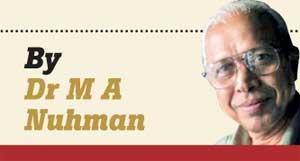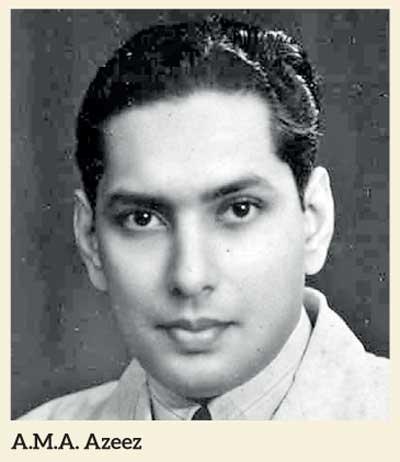Reply To:
Name - Reply Comment
Last Updated : 2024-04-19 14:00:00
 A.M.A. Azeez, a reputed Sri Lankan Muslim intellectual was born in Vannarponnai, Jaffna on October 4, 1911. He received his primary and secondary education at two leading Hindu schools in Jaffna and his BA degree in History from the Ceylon University College in 1933. He joined the prestigious Ceylon Civil Service in 1935 as the first Muslim civil servant and worked in various administrative positions in different parts of the country for 13 years. He resigned from the Civil Service in 1948 to undertake the responsibility to serve as the Principal and to develop Colombo Zahira College. He established the Colombo Zahira as one of the leading schools in the country during his period of more than a decade. He was also appointed as a Senator in1952 and his speeches at the Senate are witnessing his genuine concern about the betterment of his country and its people. He was very much respected by both Muslims and Tamils and also by the Sinhalese for his services to the communities and the nation.
A.M.A. Azeez, a reputed Sri Lankan Muslim intellectual was born in Vannarponnai, Jaffna on October 4, 1911. He received his primary and secondary education at two leading Hindu schools in Jaffna and his BA degree in History from the Ceylon University College in 1933. He joined the prestigious Ceylon Civil Service in 1935 as the first Muslim civil servant and worked in various administrative positions in different parts of the country for 13 years. He resigned from the Civil Service in 1948 to undertake the responsibility to serve as the Principal and to develop Colombo Zahira College. He established the Colombo Zahira as one of the leading schools in the country during his period of more than a decade. He was also appointed as a Senator in1952 and his speeches at the Senate are witnessing his genuine concern about the betterment of his country and its people. He was very much respected by both Muslims and Tamils and also by the Sinhalese for his services to the communities and the nation.
Azeez thought that modern education is the only tool for the progress and upward social mobility of the Muslim community from its backwardness. When he was in Kalmunai as Assistant Government Agent, he established the Kalmunai Muslim Education Society in 1942 and later he formed the Ceylon Muslim Scholarship Fund in 1945 that helped thousands of needy Muslim students to pursue higher education and continues to serve.
Azeez also thought that choosing a proper language for education is essential for the advancement and integration of the Muslim community. He has extensively written and spoken on the subject of language and education of Sri Lankan Muslims for more than three decades from the early 1940s.
Sri Lankan Muslims, who have at least a thousand years of continuous history in this country, speak Tamil not only in the North and East but also in the isolated villages surrounded by predominantly Sinhala speakers in the South. However, the Colombo based Sri Lankan Muslim elite has been more reluctant to accept Tamil as their mother tongue from the late 19th century obviously for political reasons.
They wanted to assert their separate ethnic identity to differentiate themselves from the Sri Lankan Tamils whose mother tongue is also Tamil. Therefore some of the Muslim elites propagated to adopt Arabic as their Mother’s tongue, while some of them advocated for Sinhala or English.
However, A.M.A. Azeez vehemently argued for Tamil as the mother tongue of the Sri Lankan Muslims. He wrote an article in 1941 on the subject entitled “The Ceylon Muslims and the Mother Tongue: Claims for the Tamil Language.”
He defines mother tongue as “the language in which the mother speaks to the child….the language in which the wife and husband address each other and both of them talk to their  children”, and he adds, “Ordinarily there should be in a community no doubt as to what its mother tongue is. But in the case of the Ceylon Moors, confusion in some quarters has arisen as a result of many of the Moors being bilingual and some of them being dissatisfied with the present position and wanting to go after a new mother tongue….some are tempted to advocate Arabic as their future mother tongue and others Sinhalese and still others English. These advocates do not, however, come from the Northern or Eastern parts of Ceylon where no doubt of any kind is entertained as regards to the future status of Tamil.” The contribution of Azeez in establishing Muslim identity as against Moor identity is also very important in the history of Muslims in modern Sri Lanka, although Azeez himself was using the term ‘Moors’ in his earlier writings. The word ‘Moor’ is supposed to be of Phoenician origin and was borrowed by Europeans to denote the Muslims of mixed Arab origin found in Western Spain and North Africa. The ‘Moor’ identity, a colonial invention, was imposed upon the Muslim community by the colonial rulers, first by the Portuguese and then by the Dutch and British. During the British period, the word gained currency and was widely used in colonial administration and the other domains. A section of the Colombo based Muslim elite adopted this word and persistently used it to refer to the Muslim community to serve its own class interests during the colonial period, in order to differentiate themselves from the Indian Muslims and Malays.
children”, and he adds, “Ordinarily there should be in a community no doubt as to what its mother tongue is. But in the case of the Ceylon Moors, confusion in some quarters has arisen as a result of many of the Moors being bilingual and some of them being dissatisfied with the present position and wanting to go after a new mother tongue….some are tempted to advocate Arabic as their future mother tongue and others Sinhalese and still others English. These advocates do not, however, come from the Northern or Eastern parts of Ceylon where no doubt of any kind is entertained as regards to the future status of Tamil.” The contribution of Azeez in establishing Muslim identity as against Moor identity is also very important in the history of Muslims in modern Sri Lanka, although Azeez himself was using the term ‘Moors’ in his earlier writings. The word ‘Moor’ is supposed to be of Phoenician origin and was borrowed by Europeans to denote the Muslims of mixed Arab origin found in Western Spain and North Africa. The ‘Moor’ identity, a colonial invention, was imposed upon the Muslim community by the colonial rulers, first by the Portuguese and then by the Dutch and British. During the British period, the word gained currency and was widely used in colonial administration and the other domains. A section of the Colombo based Muslim elite adopted this word and persistently used it to refer to the Muslim community to serve its own class interests during the colonial period, in order to differentiate themselves from the Indian Muslims and Malays.
It was this elitist group who formed the Moors Union in 1900 in the process of consolidating their ethnic identity. I. L. M. Abdul Azeez was the founder president of the Union. Later in the early 1920s, they established the All Ceylon Moors’ Association and in the early 1940s Moors’ Islamic Cultural Home to promote the Moor identity.
However, there was another group of Muslims who did not want the Moor identity. Instead, they preferred an all-inclusive Muslim identity and formed an organization called All Ceylon Muslim League, which was earlier known as the Young Muslim League. They wanted to refer to themselves as Muslims; not Moors. The Malays and the Coast Moors were able to align under this Muslim identity label. In the 1940s and even in the ‘50s, Sir Razik Fareed was the leading proponent of the Moor identity. He was the longtime chairman of All Ceylon Moors’ Association and was the founder of the Moors’ Islamic Cultural Home in 1944. When D.S. Senanayake, the first Prime Minister in 1949 proposed to replace the term ‘Moor’ with ‘Muslim’ in the electoral register, Razik Fareed opposed it as a threat to their racial identity.
The Moor-Muslim controversy continued for decades within the Muslim elite. A.M.A. Azeez, a strong proponent of the Muslim identity argued against the protagonist of the Moor identity in 1949 when he spoke as the chairman of the inauguration of the Ceylonese Muslim Union. About five hundred representatives from all parts of the Island participated at the inauguration. The Union seems to have been formed mainly to unite the Muslims under inclusive religious identity as against Razik Fareed’s move to promote the Moor identity in the late 1940s. Azeez strongly argued against the use of the term ‘Moor’ to denote Muslims and said that “We lose nothing by calling ourselves Ceylon Muslims instead of Ceylon Moors; on the other hand we gain appreciably by refusing to permit the dethronement of religion and the introduction of racialism in our community.” After independence, the Muslims gradually dropped the word Moor to refer to themselves. Now the term exists only in some official documents and established institutions like All Ceylon Moors’ Islamic Cultural Home, street names. A.M.A. Azeez who passed away on November 24 1973, was honoured posthumously awarding him honorary D. Lit. for his intellectual contribution by the University of Jaffna in 1980. He gave strong intellectual leadership to the Muslim community in Sri Lanka for more than three decades from the early 1940s and he will be remembered forever.
Dr M. A. Nuhman from Kalmunai, is a retired Professor of Tamil at the University of Peradeniya. He is a leading academic well known in Sri Lanka and abroad.

Add comment
Comments will be edited (grammar, spelling and slang) and authorized at the discretion of Daily Mirror online. The website also has the right not to publish selected comments.
Reply To:
Name - Reply Comment
On March 26, a couple arriving from Thailand was arrested with 88 live animal
According to villagers from Naula-Moragolla out of 105 families 80 can afford
Is the situation in Sri Lanka so grim that locals harbour hope that they coul
A recent post on social media revealed that three purple-faced langurs near t